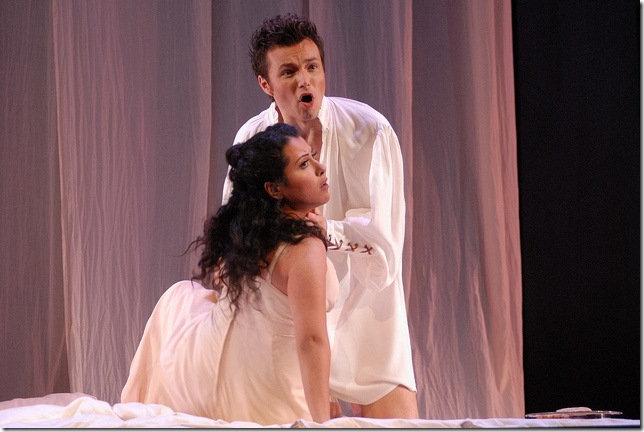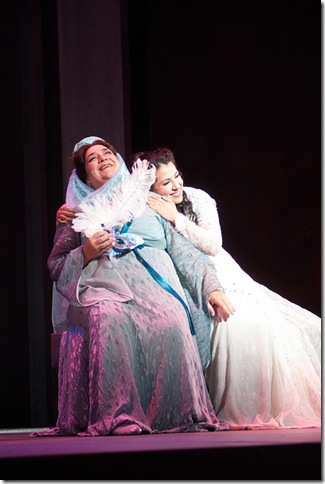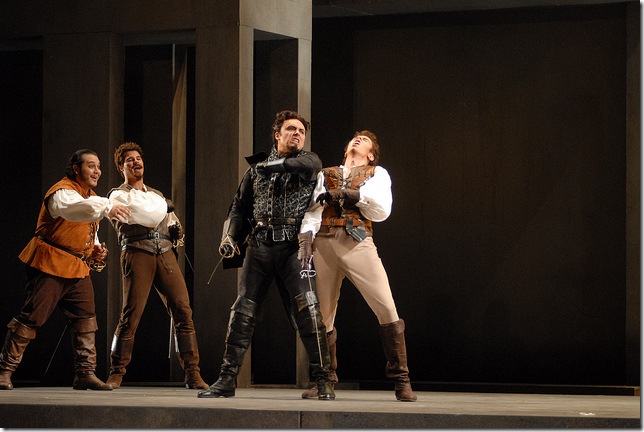The ultimate success of an opera or of a production finally comes down to the music – whether it’s good enough, in the first place, and in the second, whether it’s been sung well.
But something needs to be said now and again about a good staging. Although Florida Grand Opera has had many fine directorial hands at work over the years, its current production of Charles Gounod’s Roméo et Juliette, which closes tonight, is easily the smoothest and most seamless staging of an opera I’ve seen this company do.
Director David Lefkowich has carefully considered every part of this sometimes-creaky 1867 French opera and made every piece of business in it work, and work well. It’s a pleasure to watch, continually engaging and entertaining, and its conceits always have a justification in the text and supplement the drama rather than drowning it out.
The other good news is that the two leads in this production, Mexican soprano Maria Alejandres and French tenor Sébastien Guèze, have plenty of youthful singing strength and acting chops to spare, and they make an attractive and believable couple.
Alejandres, who sang Lucia for Palm Beach Opera’s Lucia di Lammermoor in March and will return to FGO next season as Violetta in La Traviata, has a big, clarion voice with a high register of impressive power and a pleasantly dark overall color. Her acting was credible at all times, even down to her slow, shuddering expiration next to her dead husband in the family crypt. Juliette is one of Alejandres’ favorite roles, and it showed.
Guèze has an even more taxing time of it, and he was every bit as excellent, singing with uninterrupted stamina, a large voice that moved smoothly between registers, and one that was persuasively enamored rather than over-excited. He and Alejandres blended well vocally, particularly in the Nuit d’hymenee duet in the bridal bed, and he was agile enough to fall dramatically from the tomb slab as the poison overtook him in the work’s final pages.
Fine supporting came from American mezzo Cindy Sadler in a minor role as Gertrude, the nurse; she has a rich and distinctive voice, and she was charming in a bit of good stage business involving a gang of Capulet roughs and a sword. The American tenor Daniel Shirley, an excellent Prunier earlier this season in Puccini’s La Rondine, was a good Tybalt, and in his short time on the stage his cutting, high-profile voice could be heard to fine effect.
Baritone Jonathan G. Michie was a capable Mercutio, though his Queen Mab song (Mab, la reine des mesonges) was somewhat on the slow and poky side, and didn’t have enough of the lightness and whimsicality it needed. Bass-baritone Craig Colclough, as Frère Laurent, sang with a fine sense of legato line and a good feel for the style of this music. But his voice, while attractive, needed to project more to make a weightier impact, and the same goes for bass-baritone Stephen Morscheck as Count Capulet, and baritone Joo Won Kang as the Duke of Verona.
Mezzo Courtney McKeown brought a sweet, pretty voice to her Stephano, though her Que-fais tu, blanche tourterelle would have benefited with some additional characterization so that the audience could really feel the song’s goading edge.
FGO’s chorus, directed by John Keene, deserves high marks for its work throughout the opera; many of the choral moments can sound tedious or corny if not sung with conviction and an understanding of Gounod’s style. But thankfully, that was not the case here, with the chorus singing everything from the opening prologue material to the cries of Justice! in the duel scene with precision and well-rounded vocalizing.
One of the best things about this production is the conducting of Kentucky Opera’s Joseph Mechavich, who led the proceedings superbly. Tempos were beautifully judged, and the orchestra played wonderfully for him. You rarely hear this score with the kind of big-boned force with which Gounod wrote it, but Mechavich let it rip, with first-rate results.
Of particular note was the playing of the cellos, who made so much of the returning love music without overdoing it; in short, Mechavich and the orchestra let Gounod be Gounod, and while the score may not have the harmonic imagination of Bizet or the flagrant imagination of Berlioz, it works perfectly well within its strictures, and it was gratifying to hear it be given without apology.
This is a handsome and beautiful production, borrowed from the Minnesota Opera where Lefkowich first created it. One of the most affecting things was the subtle way dance and motion were used to carry the plot along, such as in the wedding bed scene, where Romeo watches a pantomime of the deaths of Mercutio and Tybalt, occurring over and over again, and unwinding backward. It’s a brilliant effect, as are the photographs of statuary, including the Virgin Mary, that are projected over the set at key moments in the score.
Other fine bits of stagecraft could be seen in the duel scene, where each side of the conflict moves in motion, swords at the ready, to jump in when the time is right, and then hold back. It is at once a corps de ballet move and a fine expression of coiled tension, and it’s highly exciting. There are no moments where Lefkowich hasn’t thought out exactly how he wants it to look, and yet it never seems over-inventive or distractingly busy.
It simply flows, with multiple moving parts that give the audience plenty to take in throughout a long evening of more than three hours, but with the orchestra, conductor and singers making the score a living, breathing thing, it works marvelously well as a conservative, yet fresh, take on this fine opera and classic story.
Roméo et Juliette closes tonight at Fort Lauderdale’s Broward Center for the Performing Arts. Curtain time is 8 p.m., and tickets range from $21 to $200. Call 800-741-1010 or the Broward Center at 954-462-0222.


